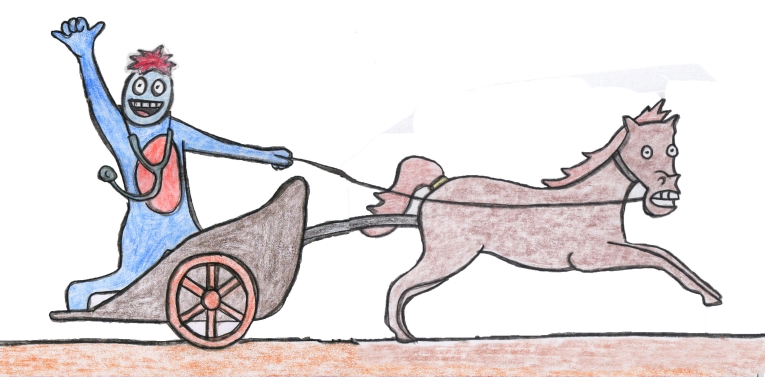People are not troubled by things, but by their judgments about things.
Epictetus
Everyone’s a little irrational now and then. But when irrationality is clinically significant, what’s the good doctor to do? Experience suggests that even when our response of “You’re being irrational” is 100% technically correct, it can still fall a tad flat.
Cerebral cortex
Cognitive behavioural therapy (CBT) assumes that those who are reasonably reasonable most of the time have more pleasant emotional lives. “The wise man is always happy—keeping an eye on his logic,” wrote Cicero, the prefeminist philosopher. Today even the Dalai Lama favours rationality: “My experience is that [mental peace] is obtained mainly through reasoning. Meditation does not help much.”2
In Greco-Roman times you might have recommended charioteer training to your overly emotional patients. The ancients believed that a wild horse represented emotion and that a vigorous charioteer represented rationality (Figure 1). Socrates, Plato, Aristotle, and other early cognitive therapists made people eudemonic (happy) largely by making them more rational.
Figure 1.
A struggling artist’s rendition of charioteer and horse: Note the charioteer’s shaka symbol, indicating that things are proceeding with pleasing velocity now that reason and emotion are aligned.
Modern times
One of CBT’s tested tools for increasing rationality is called the thought record. There are many styles of thought records with varying complexities; however, in my experience, the return on investment is highest with the 3-column version.
The simplest thought record is a pen-and-paper exercise in which patients write down what they’re feeling, what they’re thinking, and the cognitive illusions1 that might be contaminating their thinking. (Table 1 provides examples of thought records.) Although some patients lack the requisite self-awareness and self-help follow-through, many patients can comply and are helped a great deal.
Table 1.
Thought records for 3 different cases
| CASE | FEELING | THINKING | ILLUSIONS |
|---|---|---|---|
| Challenging family practice resident | Anger | They changed the call schedule just to stick it to me | Mind reading (the primary attributional error: presuming others’ intentions are sinister) Personalizing (assuming that likely random events are directed at oneself) Shoulding (insisting that others should cater to your needs because you’re you (also known as the surgeon’s fallacy) |
| Tremulous medical CBT trainee | Anxiety | I’ll never learn CBT | Emotionally reasoning (the pseudo-logic that feelings are accurate—because they’re feelings) Fortune telling (presuming to know the future) Polarized thinking (believing if you can’t master CBT, there’s no point learning it at all) |
| Unemployed man with a string of bad job interviews | Sadness | I’m a loser | Fortune telling (presuming that one’s loserhood—if in fact accurate—must continue indefinitely) Overgeneralizing (concluding that 3 bad interviews equals unemployability) Polarizing (believing that either one gets another job quickly, or one is clearly a loser) |
CBT—cognitive behavioural therapy.
Keener’s corner
If you have youthful time and energy, try adding a fourth column to your thought records; call it balanced thought if you’re diplomatic or reality if your time is short. In this column, patients summarize all evidence and describe the most likely outcomes. It helps some patients to imagine how they’d advise others in similar situations. Here’s the fourth-column contents of the tremulous medical CBT trainee:
Just because I feel like I’ll never know CBT very well doesn’t mean I won’t. I won’t know until I try. And it’s certainly not useful to look at things in all-or-nothing terms. I’d advise a colleague that further training would likely be helpful.
Tips
Thought records are by definition pen-and-paper exercises. Patients who do them “in their heads” tend to get equally ethereal results.
Thought records should never be a substitute for problem solving. If you were living in Lisbon in 1755, your earthquake-tsunami-fire tragedy would call for action, not a thought record.
Some patients prepare thought records only on an as-needed basis and are happy enough with the results. However, reason is like a muscle, with the finest results reserved for those who exercise daily.
Explain mood lag. Although rationality might stop the genesis of fresh emotionality, it doesn’t speed up the metabolism of pre-existing stress hormones.
Unlike the many tricks you see on television, do attempt thought records at home. It’s true for your patients, and it’s true for you: reason is your friend.
Acknowledgments
I thank CBT Las Vegas 2011 participants Drs Nivin Azer, Tobias Gelber, James Hollingworth, Wayne Stanley, and Priya Rajani for their insightful comments on this paper, and Ozlem Yucel for her inimitable artwork.
Footnotes
Next month: Persuasion
References
- 1.Dubord G. Part 8. Cognitive illusions. Can Fam Physician. 2011;57:800–1. [PMC free article] [PubMed] [Google Scholar]
- 2.Piburn S. The Dalai Lama: a policy of kindness. An anthology of writings by and about the Dalai Lama. Ithaca, NY: Snow Lion Publications; 1993. [Google Scholar]



